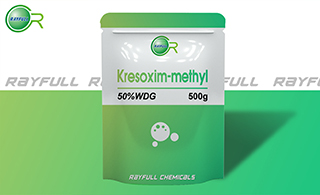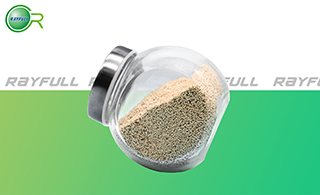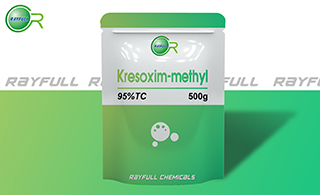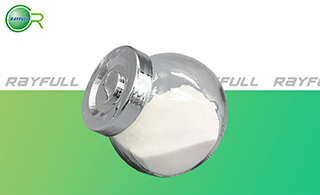KRESOXIM-METHYL
    醚菌酯 醚菌酯
Introduction: Inhibits mitochondrial respiration by blocking electron transfer between cytochrome b and cytochrome c1, at the ubiquinol oxidising site. Selectivity is partly due to enzymic de-esterification within plants. Fungicide with protective, curative, eradicative and long residual disease control; acts by inhibiting spore germination. Redistribution via the vapour phase contributes to activity. Control of scab in apples and pears (Venturia spp.); powdery mildew on apples (Podosphaera leucotricha), vines (Uncinula necator), cucurbits (Sphaerotheca fuliginea) and sugar beet (Erysiphe betae); mildew (Erysiphe graminis), scald (Rhynchosporium secalis), net blotch (Pyrenophora teres) and glume blotch (Septoria nodorum) on cereals; mildew on vegetables (Leveillula taurica, Erysiphe spp., Alternaria spp.).
Common name: Kresoxim-methyl
Another name: Candit, Cygnus, Stroby, Stroby WG, Discus (fungicide)
Chemical name: methyl (E)-methoxyimino[α-(o-tolyloxy)-o-tolyl]acetate
Empirical formula: C18H19NO4
Structural formula:

Mol. Weight: 313.35 g/mol
CAS No.: 143390-89-0
Specifications
Leading Kresoxim-methyl supplier
Kresoxim-methyl 50% WDG
Kresoxim-methyl 95% TC
Packing:
BULK PACKING
Solid: 25KG/Bag, 25KG/Drum, 50KG/Drum etc.
SMALL PACKING
Solid: 1kg/Alu bag, 500g/Alu bag, 200g/Alu bag, 100g/Alu bag, 50g/Alu bag, 15g/Alu bag etc.
Customerized packing label
Cyproconazole FAO standard
Professional registration
HAZARDS IDENTIFICATION
Hazard statement(s)
H351: Suspected of causing cancer.
H400: Very toxic to aquatic life.
H410: Very toxic to aquatic life with long lasting effects.
Precautionary statement(s)
P201: Obtain special instructions before use.
P202: Do not handle until all safety precautions have been read and understood.
P273: Avoid release to the environment.
P281: Use personal protective equipment as required.
P308+P313: IF exposed or concerned: Get medical advice/attention.
P391: Collect spillage.
P405: Store locked up.
P501: Dispose of contents/container to ...
Supplemental Hazard Statements: none
MAMMALIAN TOXICOLOGY
Acute toxicity: 1) Acute oral LD50 for rat: >5000 a.i.mg/kg. 2) Acute dermal LD50 for rat: >2000 a.i.mg/kg. 3) Inhalation LC50 (4 h) for rat: >5.6 a.i. mg/L. 4) Non- irritating to skin (rabbits). 5) Non-irritating to eyes (rabbits). 6) Not a skin sensitiser (guinea pigs). NOEL (3 mo) for male rats 2000 ppm (146 mg/kg daily), female rats 500 ppm (43 mg/kg daily).
ADI(JMPR): 0.4 mg/kg b.w. [1998]
Classification:
US EPA Classification (formulation): III (Caution - Slightly toxic)
EC Risk Classification: Carcinogen category 3: R40; N - Dangerous for the environment: R50, R53
ECOTOXICOLOGY
Effect on birds: low toxicity to birds, acute oral LD50 for Mallard ducks is >2150 a.i. mg/kg. Effect on fish: moderate toxicity to fish, acute 96 hour LC50 for Rainbow trout is 0.19 a.i.mg/L. Effect on aquatic invertebrates: moderate toxicity to aquatic invertebrates, acute 48 hour EC50 for Daphnia magna is 0.186 a.i.mg/L. Effect on honeybees: low toxicity to honeybees, contact acute 48 hour LD50 is >100 a.i.μg/bee, oral acute 48 hour LD50 is >100 a.i.μg/bee. Effect on earthworms: moderate toxicity to earthworms, acute 14 day LC50 for corr is >469 a.i.mg/kg.
ENVIRONMENTAL FATE
Kresoxim-methyl's production may result in its release to the environment through various waste streams; it's use as a fungicide will result in its direct release to the environment. If released to air, a vapor pressure of 1.72×10-8 mm Hg at 20 deg C indicates kresoxim-methyl will exist solely in the particulate phase in the ambient atmosphere. Particulate-phase kresoxim-methyl will be removed from the atmosphere by wet and dry deposition. If released to soil, kresoxim-methyl is expected to have low mobility based upon an estimated Koc of 1,700. Volatilization from moist soil surfaces is not expected to be an important fate process based upon an estimated Henry's Law constant of 3.6×10-9 atm-cu m/mole. Kresoxim-methyl degrades very rapidly in soil under aerobic conditions with a half-life less than 1 day. Kresoxim-methyl degrades very rapidly in flooded soil under anaerobic conditions with a half-life of 1.1 days. If released into water, kresoxim-methyl is expected to adsorb to suspended solids and sediment based upon the estimated Koc. Kresoxim-methyl biodegrades very rapidly under aerobic conditions with a half-life of 1.2 days. Volatilization from water surfaces is not expected to be an important fate process based upon this compound's estimated Henry's Law constant. An estimated BCF of 80 suggests the potential for bioconcentration in aquatic organisms is moderate. Kresoxim-methyl is very stable to chemical hydrolysis at pH 5, and relatively stable at pH 7 where the half-life is 34 days. Occupational exposure to kresoxim-methyl may occur through inhalation of dust and dermal contact with this compound at workplaces where kresoxim-methyl is produced or used as a fungicide. (SRC)
Usage: Discovered by BASF AG in 1983. Reported by E. Ammermann et al. (Proc. Br. Crop Prot. Conf. - Pests Dis., 1992, 1, 403). In production since 1995 and introduced in 1996. Patents: EP 253213; US 4829085. Manufacturers: BASF.
Application: A fungicide for the control of scab on apples and pears and other fungal diseases on a wide range of crops. 125-166.7mg/kg can be used to control alternaria mali on apple; 5000-7000 times solution can be used to control sacb of apple trees; 100-150g/Ha can be used to control powdery mildew on cucumber.
| 






